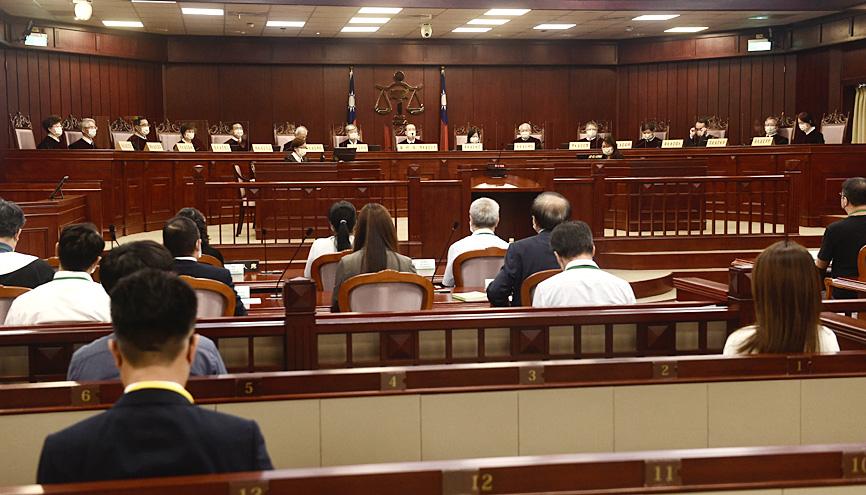The nationalization of Taiwan’s 17 irrigation associations under the Agency of Irrigation in July 2020 did not contravene the Constitution, the Constitutional Court ruled yesterday.
The move did not contravene the principle of legal clarity, nor people’s freedom of association, guaranteed by Article 14 of the Constitution, said Judicial Yuan President Hsu Tzong-li (許宗力), who heads the Constitutional Court.
The nationalization process did not infringe on property rights, nor did it violate the non-retroactivity principle or the principle of legitimate expectation, Hsu said.

Photo: Tsung Chang-chin, Taipei Times
Chinese Nationalist Party (KMT) legislators said the nationalization of the irrigation associations under the Irrigation Act (農田水利法) was disproportionate and amounted to stealing from the public.
The irrigation agency was established without amending the Organizational Act of the Council of Agriculture (行政院農業委員會組織條例), and therefore breached the legal reservation principle and the Act Governing Central Administrative Agencies and Organizations (中央行政機關組織基準法), the legislators said.
The agency was founded via executive order, instead of by following due process, they said.
The Taoyuan irrigation association, a plaintiff in the case, said the act breached its members’ freedom of association, infringed on their property rights and endangered their livelihood.
The Executive Yuan countered the argument, saying that irrigation associations are public legal persons that provide indirect administrative oversight on behalf of the government.
Therefore, the former irrigation association system was not based on constitutional rights and the associations cannot ask for basic guarantees under the Constitution, the Cabinet said.
Taiwanese expect improvements to food safety, and fair and efficient use of water in light of changing agricultural practices amid concerns over climate change, the Council of Agriculture said.
These are expectations that the irrigation associations, many of which were mired in financial and administrative issues, could no longer meet, the council said.
The need to nationalize the associations into a government agency was urgent and necessary, it said.
The government initiated dialogue with the associations and the public to ensure they are involved in every step of the transition, the council added.

INVESTIGATION: The case is the latest instance of a DPP figure being implicated in an espionage network accused of allegedly leaking information to Chinese intelligence Democratic Progressive Party (DPP) member Ho Jen-chieh (何仁傑) was detained and held incommunicado yesterday on suspicion of spying for China during his tenure as assistant to then-minister of foreign affairs Joseph Wu (吳釗燮). The Taipei District Prosecutors’ Office said Ho was implicated during its investigation into alleged spying activities by former Presidential Office consultant Wu Shang-yu (吳尚雨). Prosecutors said there is reason to believe Ho breached the National Security Act (國家安全法) by leaking classified Ministry of Foreign Affairs information to Chinese intelligence. Following interrogation, prosecutors petitioned the Taipei District Court to detain Ho, citing concerns over potential collusion or tampering of evidence. The

NEGOTIATIONS: Taiwan has good relations with Washington and the outlook for the negotiations looks promising, Minister of Economic Affairs J.W. Kuo said Taiwan’s GDP growth this year is expected to decrease by 0.43 to 1.61 percentage points due to the effects of US tariffs, National Development Council (NDC) Minister Paul Liu (劉鏡清) said at a meeting of the legislature’s Economics Committee in Taipei yesterday, citing a preliminary estimate by a private research institution. Taiwan’s economy would be significantly affected by the 32 percent “reciprocal” tariffs slapped by the US, which took effect yesterday, Liu said, adding that GDP growth could fall below 3 percent and potentially even dip below 2 percent to 1.53 percent this year. The council has commissioned another institution

NEGOTIATIONS: The US response to the countermeasures and plans Taiwan presented has been positive, including boosting procurement and investment, the president said Taiwan is included in the first group for trade negotiations with the US, President William Lai (賴清德) said yesterday, as he seeks to shield Taiwanese exporters from a 32 percent tariff. In Washington, US Trade Representative Jamieson Greer said in an interview on Fox News on Thursday that he would speak to his Taiwanese and Israeli counterparts yesterday about tariffs after holding a long discussion with the Vietnamese earlier. US President Donald Trump on Wednesday postponed punishing levies on multiple trade partners, including Taiwan, for three months after trillions of US dollars were wiped off global markets. He has maintained a 10 percent

TRADE: The premier pledged safeguards on ‘Made in Taiwan’ labeling, anti-dumping measures and stricter export controls to strengthen its position in trade talks Products labeled “made in Taiwan” must be genuinely made in Taiwan, Premier Cho Jung-tai (卓榮泰) said yesterday, vowing to enforce strict safeguards against “origin laundering” and initiate anti-dumping investigations to prevent China dumping its products in Taiwan. Cho made the remarks in a discussion session with representatives from industries in Kaohsiung. In response to the US government’s recent announcement of “reciprocal” tariffs on its trading partners, President William Lai (賴清德) and Cho last week began a series of consultations with industry leaders nationwide to gather feedback and address concerns. Taiwanese and US officials held a videoconference on Friday evening to discuss the